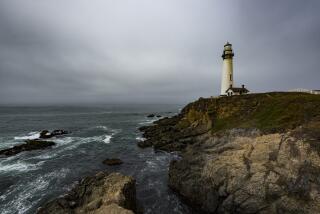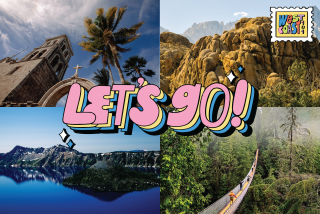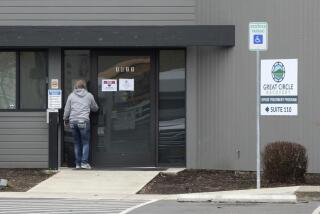Oregon Town Gropes for New Identity as Its Old Industries Falter
- Share via
REEDSPORT, Ore. — Since pioneers began trickling to the central Oregon coast in the 1850s, folks here have gone with the flow of the Smith and Umpqua rivers, living off the timber and salmon that came their way.
But as the years went on, the natural resources that people depended on began to take a turn for the worse. Logging outstripped the regrowth of local forests, and returns of wild salmon dwindled.
The final blow came last year when the Asian financial crisis caused a disastrous drop in prices for heavy brown paper and forced the shutdown of the area’s biggest employer, the International Paper Co. mill.
“You can’t count on it being a mill town anymore,” said Gary Ferguson, who raised his family working for International Paper and now oversees a mill in mothballs. “We’ve got to look at other ways for it to exist.”
Like many small towns around the Northwest that lived off the land, Reedsport has been left behind by the high-tech prosperity of the 1990s.
Now it is desperately trying to reinvent itself, looking to a successful home-grown software company, a thriving little hospital and increased tourism as roots for a new beginning.
A town of about 5,000, Reedsport is the commercial center of this isolated piece of the Oregon coast where the Smith River flows into the Umpqua River just before it empties into the Pacific Ocean.
Built in 1964, the International Paper mill in the nearby community of Gardiner eventually employed more than 300 people. But now that its workers have been cut loose, the effect of losing a $15-million annual payroll can be seen along Main Street, where several empty storefronts are sprouting “For Rent” signs.
But the folks who love living here remain upbeat.
On his way to a Las Vegas broadcasting convention to debut a new product, Custom Business Systems Inc. president Jerome Kenagy hopes other software developers will fall in love with the small-town lifestyle, spectacular sand dunes and Douglas fir forests the way he has.
Having other software developers in town would make recruiting easier, and instead of guys in suspenders walking down the street, “you’ll see guys in Hush Puppies,” Kenagy said.
At the Lower Umpqua Hospital, administrator Sandra Reese has been recruiting doctors, upgrading medical equipment and expanding a nursing home to serve the growing population of retirees.
“If this had happened five years ago, the hospital would have been in real financial problems,” she said of conditions since the mill closed. “We’ve grown enough I think we’re going to be OK. I expect the aging population to continue moving here.”
Umpqua Discovery Center director Portia Harris is overseeing construction of a new $600,000 wing to tell the story of the region’s history from the Kalawatset Indians to salmon canneries and lumber mills.
“Everything we’re hearing is, the big draw is heritage tourism,” said Harris. “We’re one of the first ones, and we’ll be top-notch.”
They have no illusions about the obstacles.
With the town hemmed in by the Siuslaw National Forest, Oregon Dunes National Recreation Area, private timberlands and the Smith and Umpqua rivers, there is little flat land for industry.
Unless some of the timberland is sold, the spectacular views from the oceanside hills will remain shut off from development of the upscale homes that executives of new companies want.
The exodus of mill workers has drawn down school enrollment, making it tougher to keep up the quality of education needed to attract new businesses.
Kenagy has a hard time recruiting computer programmers to a small town where there are no other programming jobs to jump to, and buying a pair of socks means driving 50 miles round trip.
“But it’s such a nice place to live,” he said. “If anybody paid attention to something other than ‘Is there a big flat place to build on?’ they would come here.”
Being a nice place to live never mattered in the past. When timber was king, a half dozen lumber mills turned the plentiful Douglas fir into lumber.
Salmon brought ashore where the Umpqua Discovery Center now stands were canned or shipped in refrigerated rail cars to Boston and Chicago.
Tourists jammed into town each summer to board two dozen charter fishing boats out of Winchester Bay.
Then the hard times came in the 1990s.
Logging plummeted on the Siuslaw National Forest to protect habitat for threatened salmon and wildlife. Logged-over private timberlands won’t see trees big enough for harvesting until 2030.
Over the last six years, declining returns of wild coho salmon have forced federal regulators to cut back ocean sport and commercial fishing, to the point where only a few charter boats remain.
A few crabbers and salmon trollers still land their catch at Sportsmen’s Cannery & Smokehouse, but even the first ocean sport season for hatchery coho salmon in six years, with a 15,000-fish quota, doesn’t have people too excited.
“It’s still not enough to put our charter boat in the water,” said Sportsmen’s owner, Mikayle Karcher.
A bigger draw may be the new upscale RV park across the marina, built with help from Douglas County. The pull-through spaces are oriented to block the offshore wind and offer views of docked boats and crashing surf.
It has been tougher recruiting a big industrial outfit to take the place of International Paper.
“I’ve talked to 20 firms in the last three years looking to locate here,” said Ted Walters, a former mayor who is branch manager of the Bank of America and chairman of the local economic development team. “One of these days we’ll find one.”
Cindy Sardina moved here 18 years ago to pick wild mussels off the rocks and now employs six people at her Umpqua Aquaculture oyster farm. She finds innovation seems to come naturally here.
“You don’t have all the rats in the rat race reinforcing old thought patterns,” she said. “I don’t have to wait in line anywhere. It takes five minutes to drive home.”
And there are the intangibles of living in a place you love.
“I feel more comfortable with that ocean in one eye,” she said.
More to Read
Sign up for Essential California
The most important California stories and recommendations in your inbox every morning.
You may occasionally receive promotional content from the Los Angeles Times.










